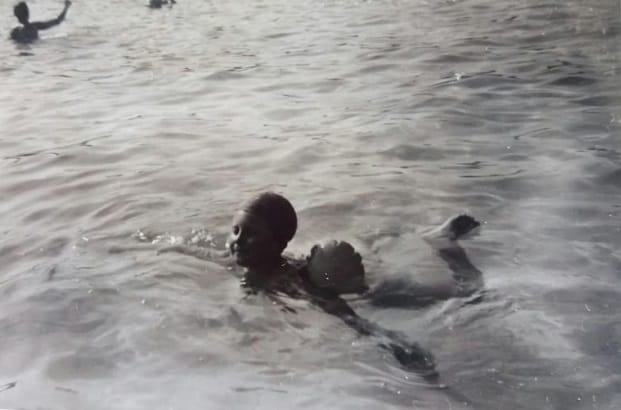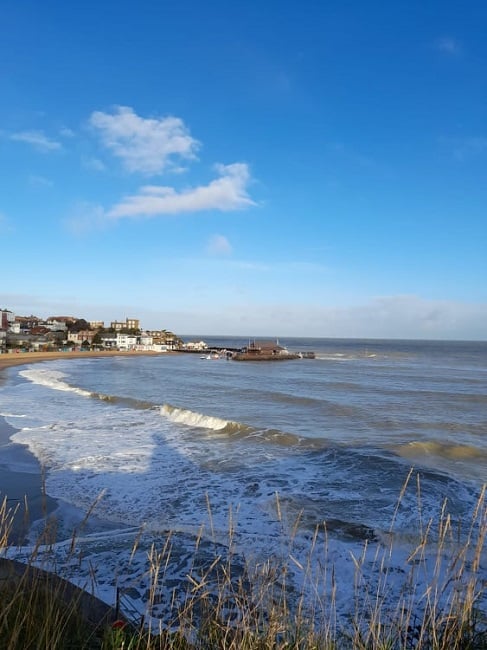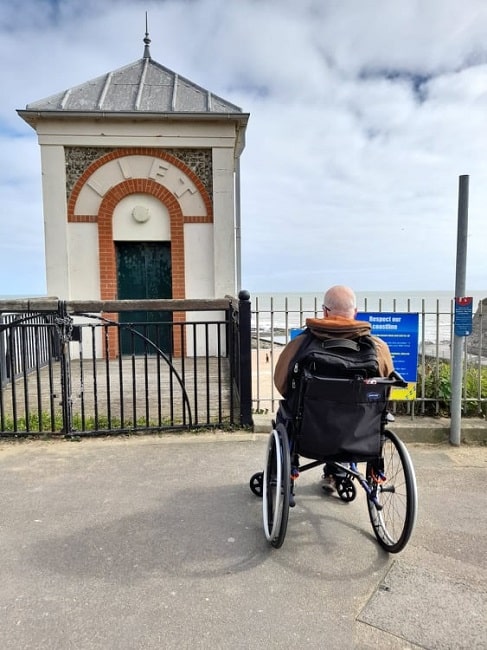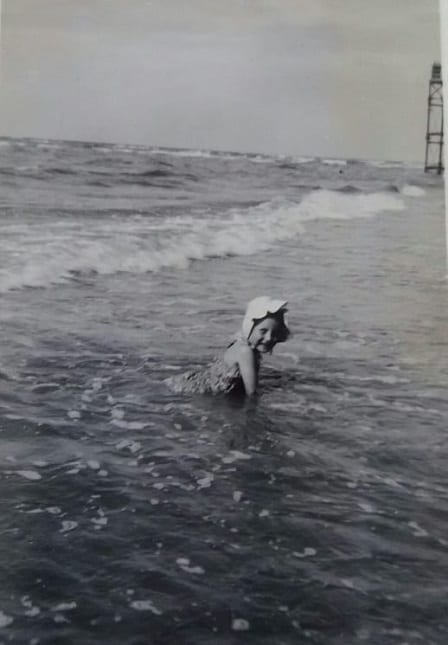
I like water — it makes my bones lighter.
As a child recovering from polio, I learned to swim with water wings in one of those huge lido type pools all our seaside resorts had in the 1950s. Being in water is the nearest we can get to weightlessness if your legs don’t work. Liberating, therapeutic — and dangerous!
I love swimming but like many disabled people, actually getting into the water can be a huge problem. The sea is often too rough on most of our beaches for people with dodgy balance to get into the water. I go in near Broadstairs harbour where the sea is calmer, and because I can’t rely on my legs I’ve invented a swimming stick. It’s a folding walking stick with a strap attached. I use it to totter into the sea and when I’m up to my waist I fling it on my back, like a harpoon. Impresses (possibly scares) the toddlers.

What I’d really prefer is a proper walkway for stickies and wheelchair users to get them into the sea safely. Or an accessible tidal pool with ramps and handrails. Ideally they’d have a hoist for people whose legs don’t work at all. We have these pools on several of our beaches already but none adapted and all mostly neglected. Think of how Thanet’s tourist offer would be “enhanced” by being marketed as a disabled friendly collection of resorts! (And isn’t it just the right thing to do anyhow?)
But of course the beach was out of bounds for much of the summer with sewage spills. Thanks Southern Water! And then there’s the access problems. With the various lifts open, especially Broadstairs, disabled people can reach the beach easily. With the lifts closed, the challenge is much greater.

Of course we have indoor-swimming pools. But not all have comfortable access. I can’t use ladders into or out of the water. I need proper steps with a handrail each side. I got stuck in the swimming pool on holiday in Spain two years ago because the top step was too high for me to use. In was ok. Out needed me to humiliatingly crawl onto the side and beg the help of sympathetic fellow swimmers to get upright again. And I’m slippery when wet….
A huge comfort if your bones hurt is warm water. In the old days, pre-covid, and before the latest round of NHS cuts, physiotherapists could use the hydrotherapy pools in most of our hospitals for gentle exercise in deep warm water. It got me back on my feet intermittently throughout the last seventy years of recovering from the knock on effects of polio.
I was in the hydrotherapy pool at a London hospital when the news came that Margaret Thatcher had resigned. The whole hospital cheered. But subsequent governments have made cost savings and cuts and hived off services to private companies and you have to find more and more of your health comforts for yourself now.
The affluent well — lucky them — can put their minor aches and pains into a luxury spa experience, but the arthritic pensioners can’t!

Kent County Council can loan you bits of useful equipment. The kind occupational therapy department have fixed me up with a means of getting into hot water — no, not politics, a “bathing cushion”. It’s a huge balloon that fixes with suction cups in your bath. You inflate it by plugging it into a portable battery, climb on while it’s firm and deflate to lower yourself into the water. And inflate to raise yourself. Sounds easy. It’s not! Sliding off is a real hazard and dropping the control to raise it means you’re yelling for help etc etc. Comforting but not hydrotherapy.
So what do I conclude from my water whitterings?
Southern Water owes me, and you, an accessible clean sea. The NHS needs proper funding so we can all expect the treatment that’s needed for our particular problems. I shouldn’t be scrabbling around in the private sector for accessible swimming pools or hydrotherapy.
I worked from 1963 to 2013. I think I chipped in for a functioning welfare state and good public services. Don’t we all want that?

